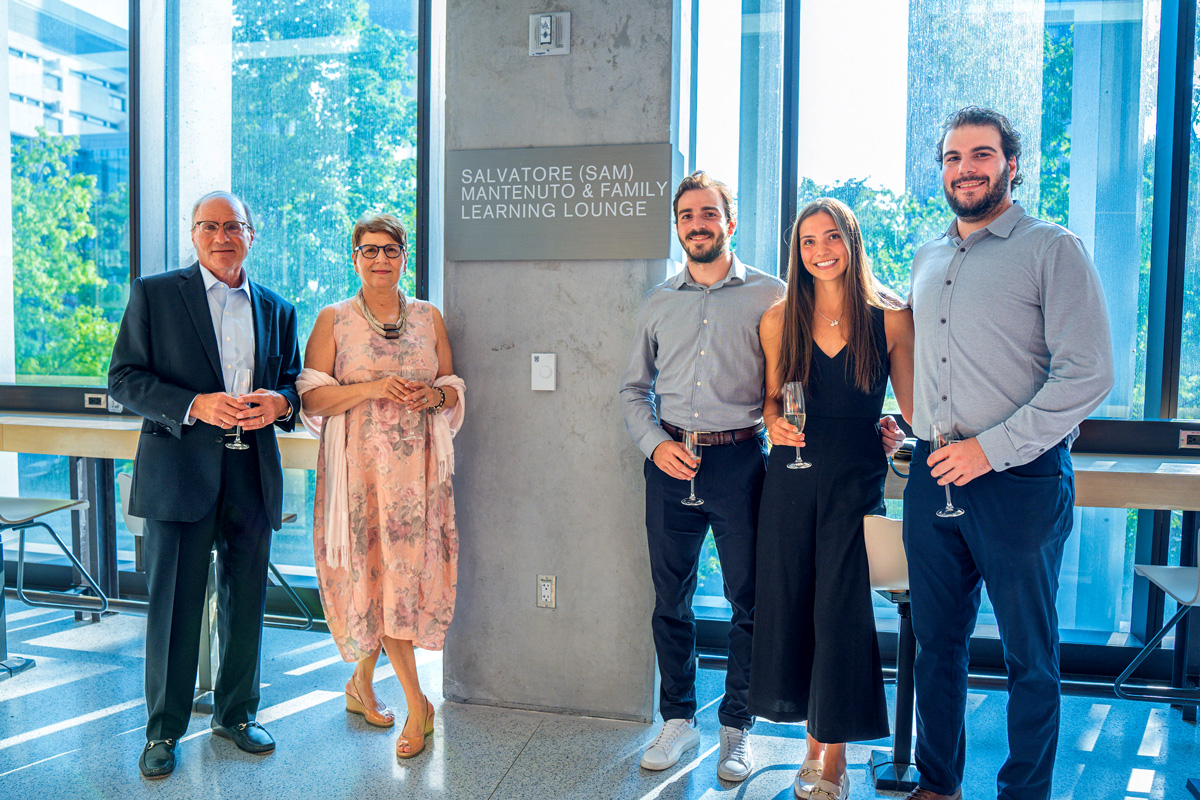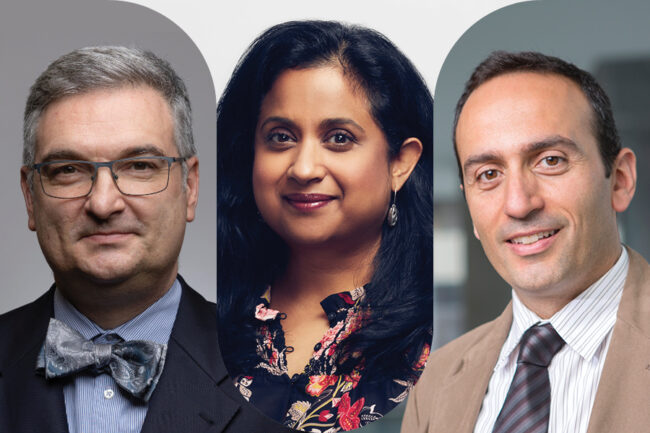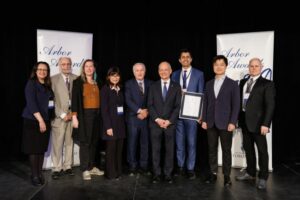
MARCH 7, 2024 • By Heather Finley
Sam Mantenuto (ElecE 8T0) is deeply passionate about community, lifelong learning and giving back. Whether volunteering as chair of the Industry Advisory Board at The Edward S. Rogers Sr. Department of Electrical & Computer Engineering (ECE), teaching CAMH clients to skate, or playing hockey with his classmates, the retired Northland Power COO and CDO believes that collaboration, social responsibility and a positive attitude are the keys to personal and societal wellbeing. And this outlook is also part of his identity as an engineer.
“Sam is proud to call himself an engineer, especially given the many critical roles engineering brings to problem-solving, innovation and leading in a morally and ethically responsible manner,” says Professor Deepa Kundur, ECE Chair.
“He puts ideation into action at U of T and beyond — leading by mentoring and inspiring. We are incredibly grateful for his dedication and generosity.”
In 2022, Mantenuto made a transformational gift to modernize ECE’s undergraduate teaching labs. To recognize his generosity, U of T has named the Myhal Centre for Engineering Innovation & Entrepreneurship’s second-floor student space, the Salvatore (Sam) Mantenuto & Family Learning Lounge.
For Mantenuto, both spaces are important for related reasons: education is important, but as social beings, interaction is equally important. The Lounge is a venue where students can clear their minds, exchange ideas and stay connected with each other.
With U of T’s Giving Day fundraising campaign underway, writer Heather Finley spoke with Mantenuto about his time as a student, his career and his contributions to U of T Engineering and beyond.
What is the value of an engineering education?
The subject matter is interesting, but it’s also practical. It teaches you critical thinking, and the culture is important, too. Engineers are dedicated people, they’re meticulous, and they’re ethical. You’re around good people, and you become part of that community. Engineering also sets a great foundation for other disciplines if you decide to pursue something else, including in the fields of medicine, finance and law, for example. Engineering also provides a strong base to pursue leadership and technical opportunities at all levels of management and ownership in a broad spectrum of industries.
What was your biggest challenge in the program?
I came from a small high school with a lot of close-knit friends. It was overwhelming on my first day to see so many people in first year — I felt lost in a sea of students. Combined with my feeling that everyone else was smarter than me, I felt discouraged.
How did you overcome this challenge?
I had a cousin, Peter Dilullo (CivMin 7T8), who was in third year, who became my mentor and coach. He supported me and encouraged me. He helped me develop the confidence that I could succeed. I was very lucky to have Peter. Senior students and alumni can help undergrads by being a person they can talk to, and start instilling in them the importance of mentoring the next generation.
I also played a number of sports — hockey, touch-football, soccer, squash and some basketball. Playing sports was a great way to re-energize myself mentally and physically. If I needed a break, I would play between classes or after school.
What are some ways you like to volunteer?
Mental health has become such a big issue, and for me, sports have always been a good outlet. I like the exercise and social interaction, so I set up a learn-to-skate program for CAMH as an example to the patients. I organized volunteers and I got skates, helmets, and gloves. A whole range of outpatients and inpatients came out once a week for an hour, and we taught them how to skate. It was rewarding to see their confidence growing, and how my passion for sports could help people coping with anxiety, depression or isolation.
How do you volunteer at U of T?
I started with the Faculty Council where I’m an alumni rep, and now I’m embarking on the role of chair of the ECE Industry Advisory Board. It’s a new group and we’re going to work together to help the program, build engagement for students and research, and look at other areas of learning and development. I believe we can leverage the great talent pool at the university to help students, and to elevate ECE’s program and profile even higher.
What are other areas you’d like to contribute to at U of T?
I would like to build stronger connections between U of T and the energy sector. I’ve worked in a variety of areas and levels within the power industry. Given my experience, I believe there are fascinating opportunities for engineers in all aspects of generation, transmission, distribution and trading. This is going to grow as the technology for cleaner, more efficient generation continues to evolve. Smarter grid technology and management will become more critical, renewable power will become a significant portion of the resource mix, and AI will be incorporated into all facets of the industry. It is an exciting time.
Why is it important for U of T Engineering alumni to stay connected to each other?
There are many benefits to staying connected and maintaining relationships. This includes lasting friendships and leveraging relationships in your career. It means support through both good and bad times, sharing common values and memories, and maintaining that special feeling of being part of something that is cherished and well respected.
And the more you volunteer, the more alumni you meet, and the more you and others benefit.
What is your favorite part of your ongoing connection to U of T?
Having the opportunity to stay connected with U of T’s exciting programs keeps me mentally stimulated. I get to work with bright, energetic people to address issues, and the fact that I’m helping feels good — it’s rewarding and gives me a sense of satisfaction and purpose.
Story from U of T Engineering News


